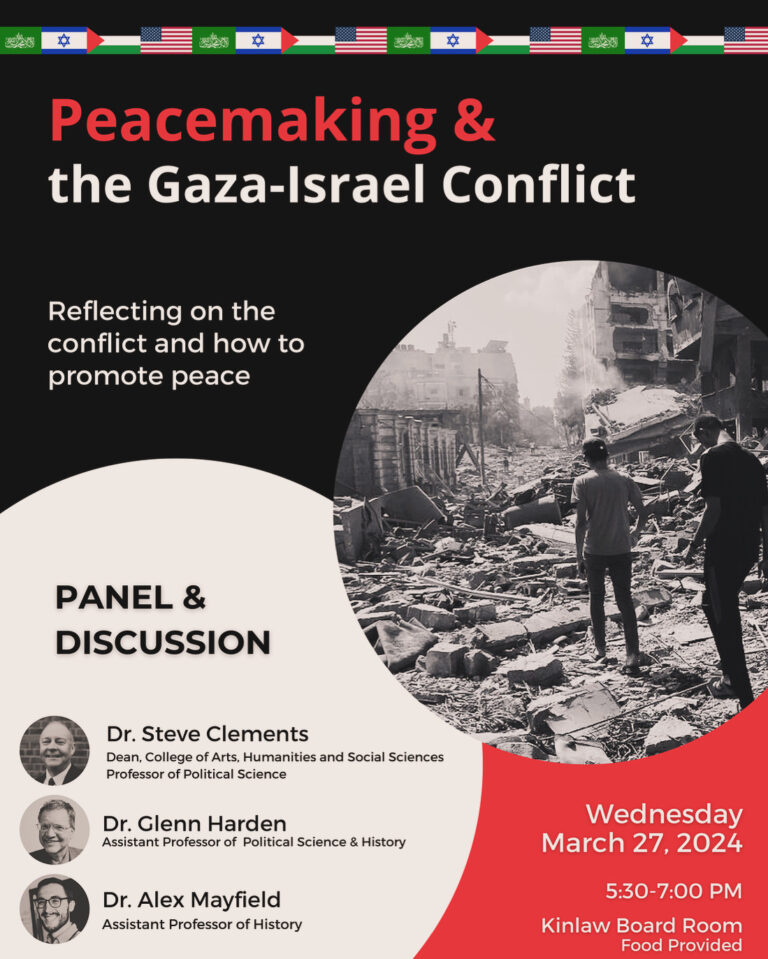The news flashes on our screens, and the usual barrage of conflict, war and suffering, plays on the screen as each day seems to be a replay of the last. It is easy enough to pay attention to the headlines and catch snippets of a news segment, but unfortunately, for many people, a conflict occurring thousands of miles away that concerns people who seem unfamiliar simply slips the mind as they go about their everyday lives.
Halfway around the world, Gaza has been enduring constant bombing as the war drags into its seventh month, with over 30,000 people killed. Asbury students, upset with the lack of conversation on the conflict, communicated with several faculty members to create a space for learning, conversation and reflection. This materialized in a panel and discussion event titled “Peacemaking and the Gaza-Israel Conflict” that took place on March 27, with around 20 students attending and three panelists giving presentations.
Dr. Glenn Harden, a panelist who put together the idea for the event, spoke about where the idea came from: “someone put anonymous notes under several of our doors asking why the University had not addressed the Israel-Hamas War. I’m a scholar of International Relations and I took that question to heart. The War is important, and I wanted to address it in a way that was both serious and Christian. That’s why I wanted peace-making to be the focus of the panel.”
Dr. Harden spoke alongside Dr. Alex Mayfield and Dr. Steve Clements, who each drew on their disciplines and contributed insight from their fields of study. Each panelist took around 15 minutes to present information regarding the historical and theological context, U.S. perspectives on the conflict and peace efforts.
To begin the discussion, Dr. Mayfield opened with an important reminder about how discussion around an often-tense topic should be addressed. “Everyone is an image bearer of God, with dignity and humanity. That every side, every person, no matter their religion or race or creed, is beloved by God. With that being the foundation of our conversation going forward, let’s lead with compassion, and let’s seek truth.”
Dr. Mayfield spoke on the theological and historical background of the conflict, putting into perspective the region’s history. Main historical events were discussed, such as the Zionist movement, the 1917 Balfour Declaration, the British Mandate of Palestine and the Nakba. Dr. Mayfield also gave a voice to how the theological construction of Israel is often conflated with the modern-day construction of Israel, citing how scripture can easily be misconstrued.
Dr. Clements laid out the American involvement in the creation of Israel from the period after WWII with relatively little support to becoming a major supporter of Israel during the 1970s due to political reasons. During the 1970s, Evangelical Christians began holding dispensationalist views of the Bible, which promoted support for the state of Israel based on the literal interpretation of the Scriptures. Its effects are apparent today, with large percentages of the Evangelical Christian population showing adamant support for Israel.
Finally, Dr. Harden defined terrorism and explained the many effects that terrorist attacks have. He also spoke about how disproportionate responses can hamper peace efforts and the incentive structures that exist for Netanyahu to continue bombing Gaza.
Students interacted with the panel presentations, with allotted time after each panelist to pitch questions and to build on the questions other students had voiced. While questions were answered, there was the understanding that a conflict, which has spanned over nearly a century, carries questions that are larger than what a one-and-a-half-hour discussion could tackle. However, the panel provided a place for conversations to begin.
“I think it is always important to be able to ask questions, and to hear from people who have personal ties and experiences with conflicts and issues like this,” said Marissa Green, a student who attended the event. “I walked away with a conviction to learn on my own and to continue to foster good, productive conversations.”
“As a Christian university, I think we can bring this recognition of human dignity to the broader conversation, and, indeed, that we have a peace-making obligation to do just that. But first, we need to have the conversation among ourselves,” said Dr. Harden. “I do hope that some students find ways to begin or continue efforts for peace-making. I want students to know that they have power—maybe not enough to create a just peace—but power to contribute to making one.”
When asked about the future of the conversation at Asbury, Dr. Mayfield hoped that students would see the event as a starting point for continued action. “I hope it inspires students to realize they can do something to foster peace right now. Be it bake sales for relief funds or writing a representative to advocate for a ceasefire, we are not helpless in the face of protracted violence. Jesus said that peacemakers are blessed. That doesn’t mean peacemaking is easy, but it does mean it is good and that it is something we must pursue as the people of God.”




